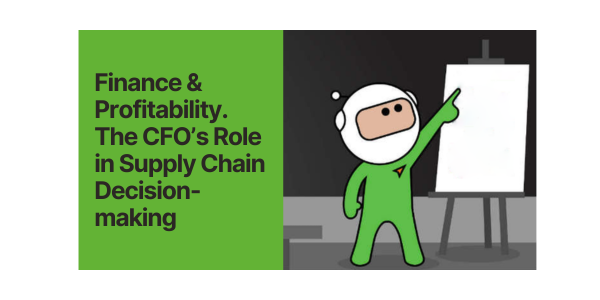Finance & Profitability. The CFO’s Role in Supply Chain Decision-making
Caroline Macleod
July 9,2019


Whilst the roles of the Chief Operating Officer (COO) and ‘traditional’ supply chain teams are well defined and understood, the responsibilities of the Chief Finance Officer (CFO) and their involvement in supply chain decision-making have evolved considerably.
These days, it’s unlikely the CFO will be confined to the fixed set of financial disciplines they trained for. Their role has become far more strategic in nature and closely tied to agile decision making in the supply chain.
With pressure mounting, the CFO is still expected to deliver on their core responsibilities of financial planning, financial risk management, compliance, and reporting, yet increasingly have a role to play in reshaping today’s digital business.
Some of the drivers behind this change include globalisation of the supply chain, the availability of financial information in (near) real-time, and an insanely competitive environment in which even a small competitive edge can make a substantial contribution to improved performance, market share and profitability.
Presented with this, the requirement for CFO's to take a wider view of the supply chain is not without its challenges.
It’s likely a CFO’s previous exposure to the digital supply chain was limited or they relied heavily on others within the organisation to help shape their perspective and inform decision making.
Notwithstanding previous limitations, the move is firmly on for CFO's to understand and develop greater insight into overall organisational supply chain performance.
In a broader sense, CFO's are expected to play a significant role in helping organisations decide where they can best compete, how they can compete effectively, and which opportunities represent the best chance to take on the competition and achieve significant wins.
Today, a CFO who embraces the opportunity to influence strategic decision-making of this type is a valuable player, creating new skills demands over and above financial events that are historic and had already taken place.
Access to comprehensive, real-time performance and financial data across the supply chain has empowered CFO's to make quick, strategic decisions that can deliver a significant upturn in profitability.
Not only that, trends analysis based on the availability of accurate data is further enhancing the piece, and ultimately leading to increased customer satisfaction and less money tied up in redundant or slow-moving stock.
From the CFO’s perspective, things are moving quickly now and it’s no longer enough to set budgets annually or quarterly based purely on historical numbers — was that even the right strategy in the first place.
CFO’s are not just adding up the numbers anymore. They’re making a real and strategic operational contribution that helps steer the ship through competitive waters where technology means decision making can sometimes be measured in milliseconds.
The role of the CFO in supply chain decision-making has changed dramatically and the responsibility to embrace and profit from the change falls on both the CFO and the organisation they support.
In doing so, the opportunity to compete effectively or even gain a competitive edge is the reward – and what organisation doesn’t want to stay ahead of the pack?